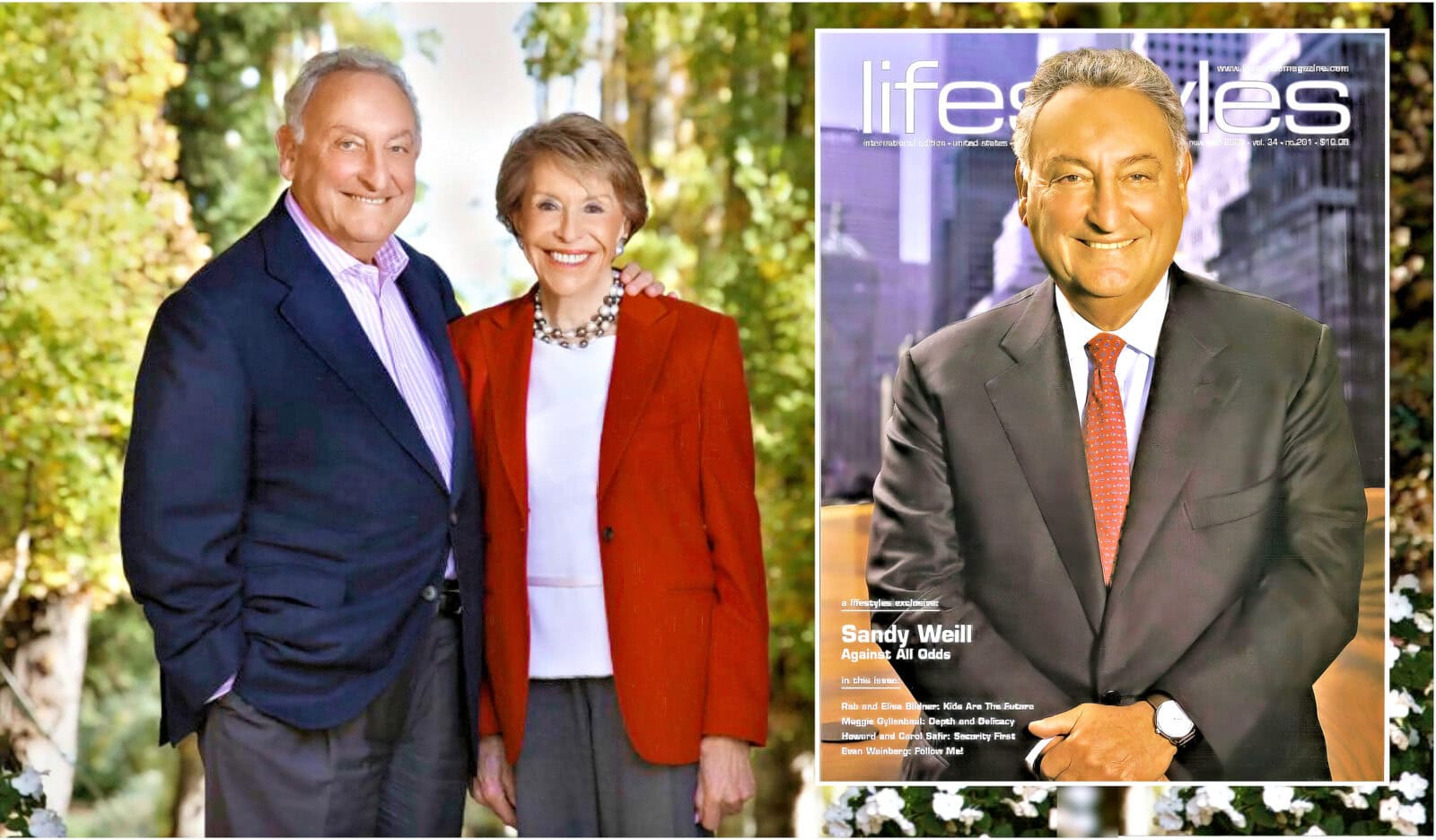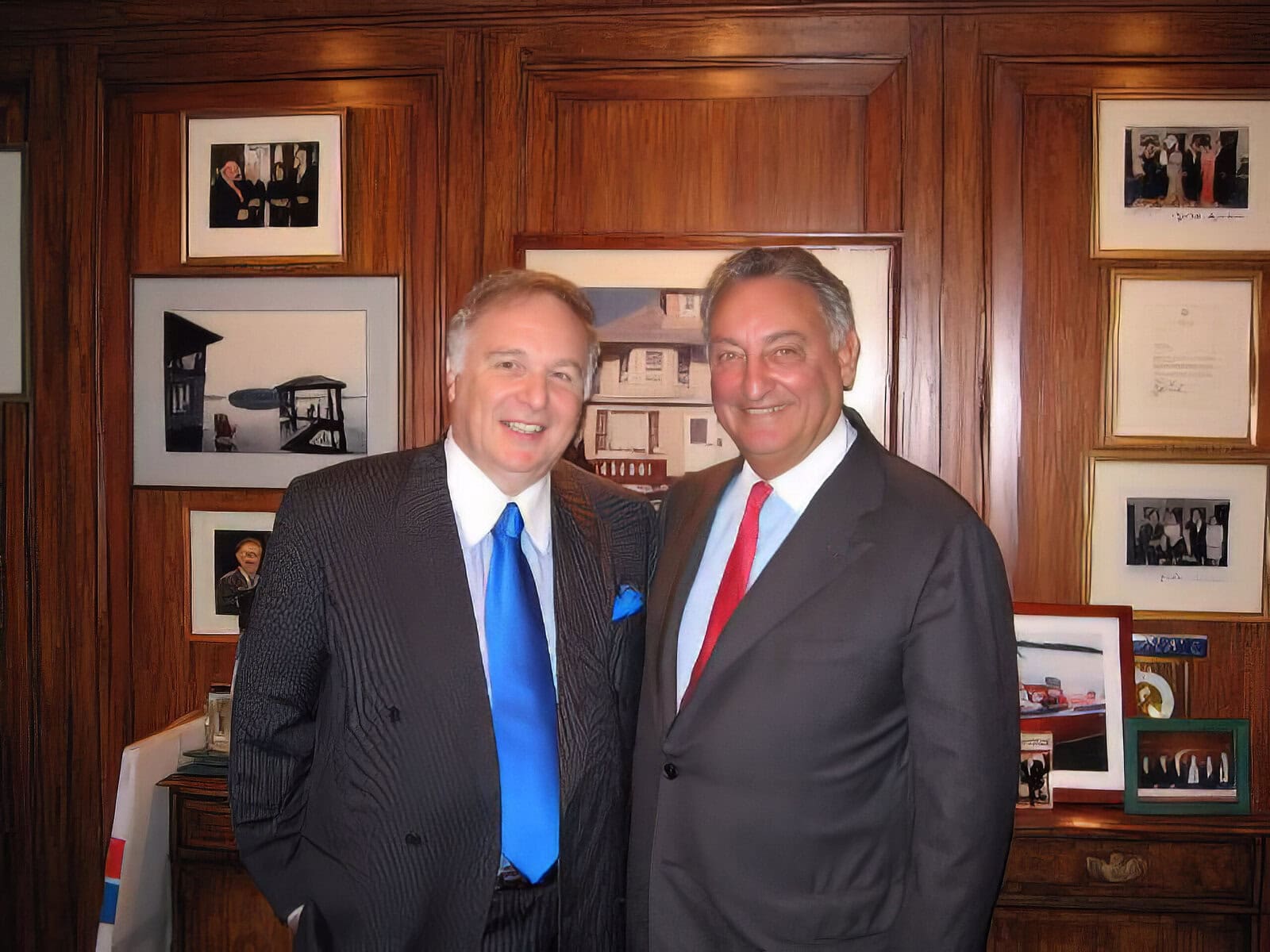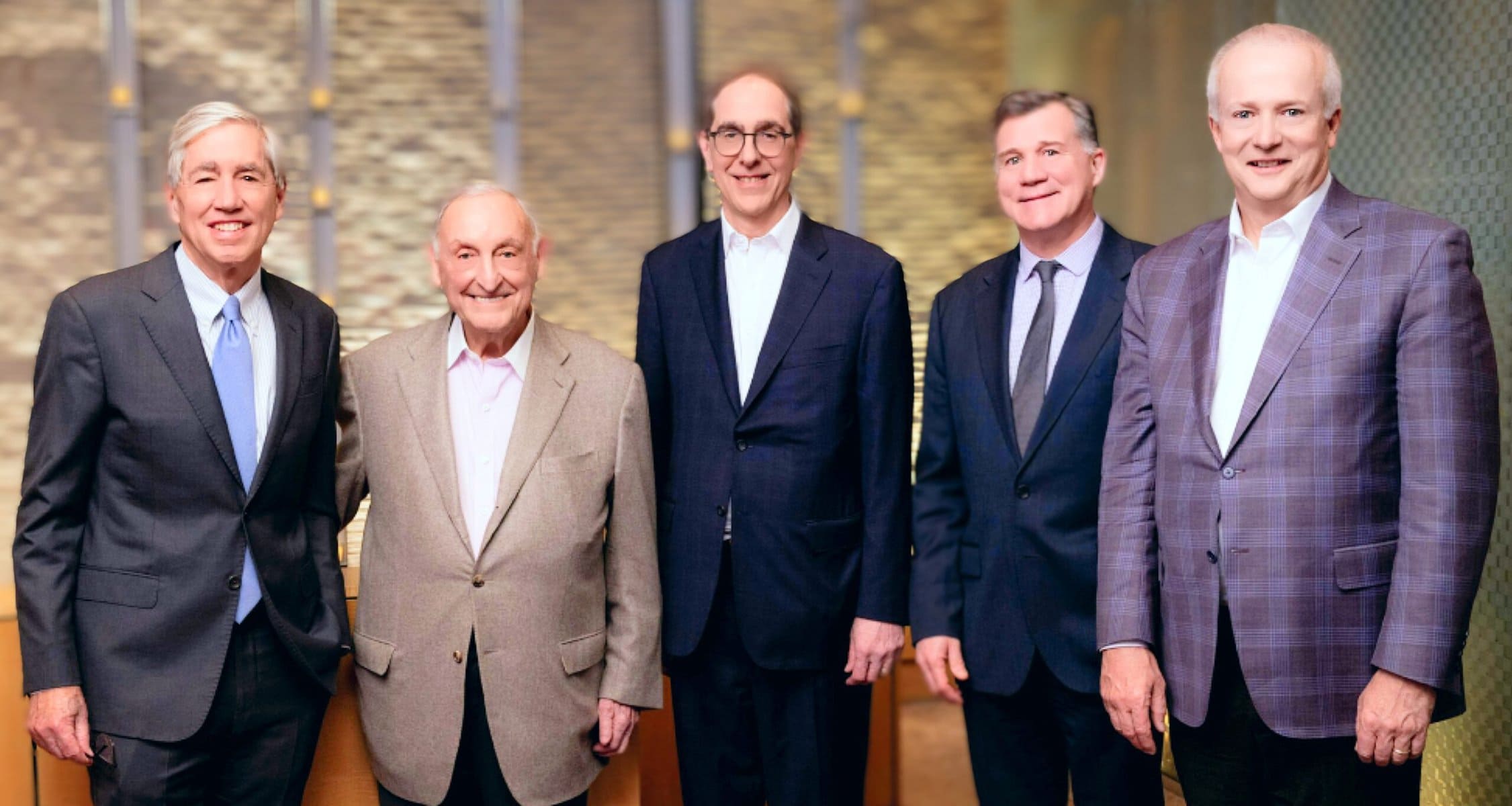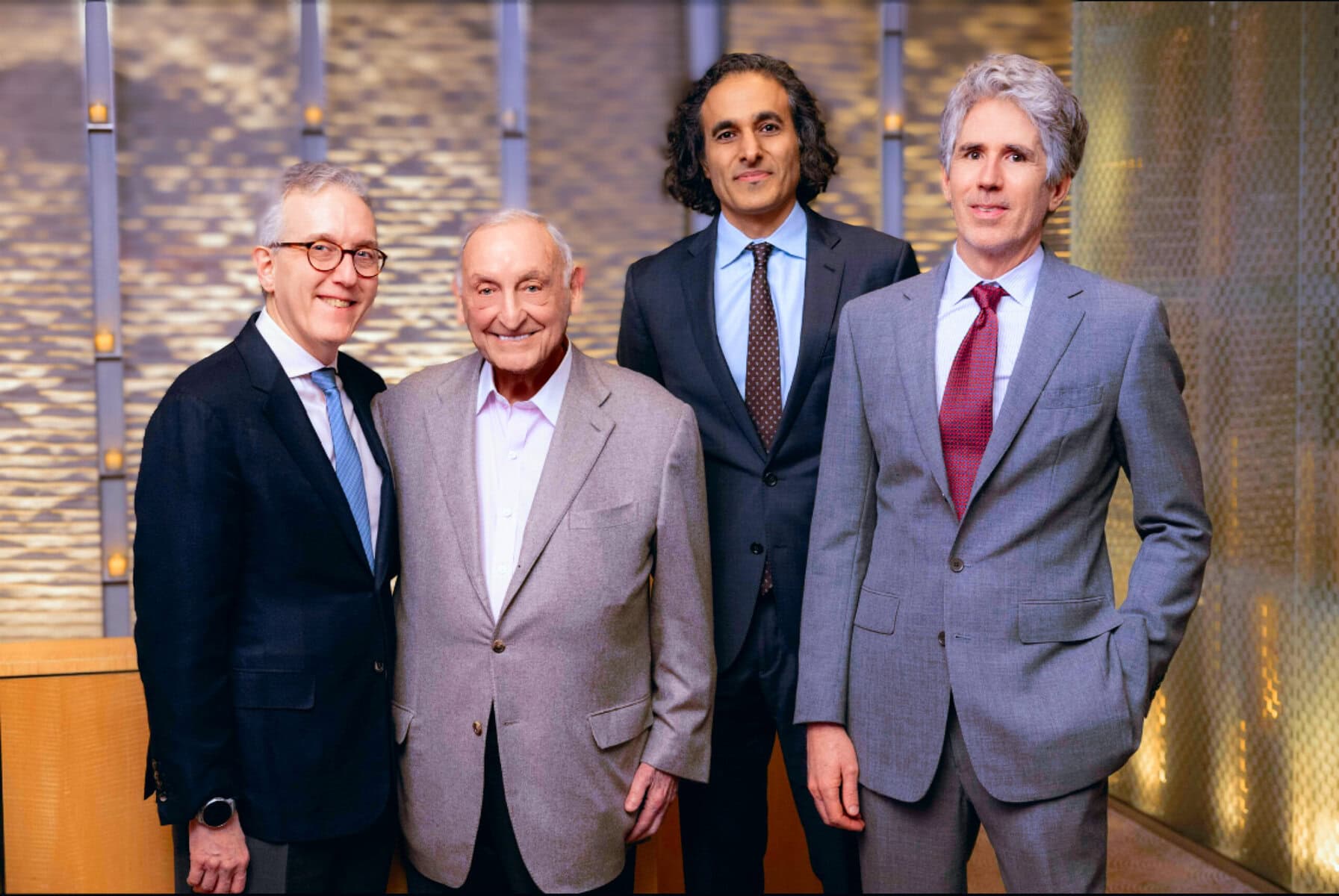$50 million latest gift from Joan and Sanford I. Weill launches Weill Cancer Hub East, elevating their philanthropic giving well beyond the billion-dollar mark

With a mission to understand how nutrition and metabolism impact the body’s ability to control cancer, four leading research institutions have united under the Weill Cancer Hub East, an innovative, collaborative partnership that aims to transform cancer treatment.
The initiative connects world-class experts from Princeton University, Rockefeller University, Weill Cornell Medicine, and the Ludwig Institute for Cancer Research to enhance immunotherapy, a therapeutic strategy that harnesses a patient’s own immune cells to treat cancer.
Immunotherapy holds much promise, but its effectiveness varies in different people and against various types of cancer.
The Weill Cancer Hub East was established with a transformational $50 million gift from the Weill Family Foundation, directed by visionary benefactors Joan and Sanford I. Weill. This gift was matched with philanthropy from each partner institution, totaling more than $125 million.
The initiative seeks to break down institutional barriers and unite top experts in cancer biology, cancer clinical trials, immunology, nutrition, and metabolism to drive pioneering, cross-field collaboration that pushes the boundaries of scientific discovery.
Over the next decade, the Weill Cancer Hub East will marshal multidisciplinary teams to explore the complex relationship between solid tumors and the environment in which they form and grow.
Their investigations will leverage the complementary strengths of each research institution to illuminate how the food we eat and the beneficial microbes that help metabolize that food influence the effectiveness of cancer treatments such as immunotherapy.
The hub will also evaluate how emerging therapeutics, including a class of diabetes and anti-obesity drugs called GLP-1 agonists, might impact cancer progression and treatment.
“The Weill Cancer Hub East will offer doctors and scientists a tremendous opportunity to revolutionize the treatment of cancer, a disease that complicates so many lives,” said Sandy Weill, founder of the Weill Family Foundation and chair emeritus of the Weill Cornell Medicine Board of Fellows.
“With the best minds in the field armed with the most advanced research techniques, the Weill Cancer Hub East will seek to elevate immunotherapy and improve patient care for people battling cancer. Joan and I could not be more excited about the endless possibilities of this special partnership—investment in science and medicine is our labor of love.”
The Weill family and the Weill Family Foundation have long championed the advancement of exceptional science and medicine.
The Weill Cancer Hub East exemplifies the notion that teamwork inspires the best, most groundbreaking science, and is the second such collaborative entity to be established recently through the Weill family and its foundation’s philanthropy.
The Weill Neurohub, founded in 2019, engages researchers and clinicians from UC San Francisco, the University of California at Berkeley, the University of Washington, and the Allen Institute to speed the development of new treatments for neurological and psychiatric diseases.
The Weill family and the Weill Family Foundation have gifted over $1 billion to nonprofits in the United States and around the globe, ranging from education, social causes, music and the arts to medical research and patient care.
Heralded as the “fifth pillar” alongside surgery, radiation, chemotherapy, and precision-targeted therapeutics, immunotherapy is a powerful approach for many types of cancers. While the other therapies attempt to remove or attack cancer cells directly, immunotherapy utilizes a patient’s own immune system to strike the disease from within.
“How we can increase the effectiveness of immunotherapy across all cancer types and patients is one of the scientific questions that most needs answering,” said Dr. Robert A. Harrington, the Stephen and Suzanne Weiss Dean of Weill Cornell Medicine.
“By convening world-class institutions with leading investigators in their respective fields, including those at Weill Cornell’s Sandra and Edward Meyer Cancer Center, the Weill Cancer Hub East seeks to discover new ways that nutrition and gut microbes can improve the immune response to the disease. This initiative is a testament to the power of philanthropy to advance science and medicine, and we are profoundly appreciative of Joan, Sandy and the Weill Family Foundation for their out-of-the-box, visionary commitment.”
Using the latest advances in metabolomics, immunology, computational analysis, and artificial intelligence, the Weill Cancer Hub East will explore how metabolism affects the immune system’s ability to recognize and control cancer.
“The hub will enable extraordinary biomedical scientists, leading clinicians, and the New York medical community to join forces in new ways and leverages our academic research with amazing translational and clinical expertise,” said Christopher L. Eisgruber, president of Princeton University.
“At Princeton, we have found that when we support collaboration across disciplines, transformative scientific advances follow. This unprecedented partnership in our region’s biomedical innovation ecosystem has the potential to speed cures and treatments where they are most needed.”
The hub will offer seed funding to basic, clinical, and translational scientists from Princeton University, The Rockefeller University, and Weill Cornell Medicine to pursue collaborative projects that focus on reprogramming the tumor microenvironment and augmenting cell function by modulating patients’ metabolisms and microbiomes.
The hub will also offer a portfolio of clinical trials, including those that explore whether GLP-1 agonists, which are designed to modify a person’s metabolism, have downstream beneficial effects on a cancer patient’s immune response and outcome.
Findings gleaned from these investigations may have applications in cardiovascular, metabolic, and autoimmune conditions.
“Immune modulation and engineered immune effector cell therapies have transformed the treatment of a number of cancers, begging the question of how these and related therapies can be extended to many others,” said Dr. Richard Lifton, president of The Rockefeller University.
“The funding for this collaboration allows for a deep, mechanistic investigation into how one’s diet, metabolism, and microbiome can affect cancer immunotherapy. Promoting the integration of basic science and clinical investigation will promote discoveries that will improve patient outcomes.”
As a leading international sponsor of cancer research, the non-profit Ludwig Institute for Cancer Research is already funding innovative studies in cancer metabolism and immunotherapy at its Collaborative Laboratory at Weill Cornell Medicine and in its Branch at Princeton University. These laboratories will provide additional investigative support to the efforts of the Hub.
“In establishing our Institute, Daniel K. Ludwig expressed the hope that his philanthropy would enable a sustained, extensively collaborative effort to conquer cancer,” said Dr. Chi Van Dang, CEO and Scientific Director of the Ludwig Institute for Cancer Research.
“This collaboration, galvanized by the Weill Cancer Hub East, is in line with our vision to bring world-class expertise together to yield discoveries that help us overcome the metabolic challenges tumors pose to cancer immunotherapy, with the goal of alleviating the suffering of cancer patients.”
A scientific steering committee, comprising one scientific leader from each academic institution, will oversee the hub’s scientific activities. The committee members are:
Dr. Joshua Rabinowitz, professor in the Department of Chemistry and Lewis-Sigler Institute for Integrative Genomics at Princeton University, and director of the Princeton Branch of the Ludwig Institute for Cancer Research.
Dr. Sohail Tavazoie, the Leon Hess Professor, head of the Meyer Laboratory of Systems Cancer Biology and director of the Black Center for Metastasis Research at The Rockefeller University
Dr. Jedd Wolchok, the Meyer Director of the Sandra and Edward Meyer Cancer Center, co-director of the Ludwig Collaborative Laboratory and co-director of the Parker Institute for Cancer Immunology at Weill Cornell Medicine
A leadership committee, comprising leaders from Princeton, Rockefeller, Weill Cornell Medicine and Ludwig, along with representatives from the Weill Family Foundation, will direct the hub’s scientific strategy.
Licensed discoveries with commercial potential will provide further financial support for the hub and ongoing philanthropy from each of the three academic institutions.
The hub’s structure will ensure adaptability to unexpected and unknown future cancer research directions.
The hub will also support the recruitment of talented colleagues to fill knowledge gaps and train the next generation of cancer researchers.
Symposia, retreats, and meetings will be important components of building and expanding the team model, as they are designed to share information, harmonize and encourage new alliances, and inspire participants across the hub and beyond.
“The Weill Cancer Hub East has enormous potential to transform the way we treat cancer and change the world,” Sandy Weill said. “Joan and I can’t wait to see all of the innovations that emerge from the initiative.”
Weill Cornell Medicine is committed to excellence in patient care, scientific discovery and the education of future physicians in New York City and around the world. The doctors and scientists of Weill Cornell Medicine—faculty from Weill Cornell Medical College, Weill Cornell Graduate School of Medical Sciences, and Weill Cornell Physician Organization—are engaged in world-class clinical care and cutting-edge research that connect patients to the latest treatment innovations and prevention strategies.
Located in the heart of the Upper East Side’s scientific corridor, Weill Cornell Medicine’s robust network of collaborators extends to its parent university, Cornell University; to Qatar, where Weill Cornell Medicine-Qatar offers a Cornell University medical degree; and to programs in Tanzania, Haiti, Brazil, Austria, and Turkey.
Weill Cornell Medicine faculty provide exemplary patient care at New York-Presbyterian/Weill Cornell Medical Center, New York-Presbyterian Westchester Behavioral Health Center, New York-Presbyterian Lower Manhattan Hospital, New York-Presbyterian Queens, and New York-Presbyterian Brooklyn Methodist Hospital.
Weill Cornell Medicine is also affiliated with Houston Methodist.
Rockefeller University is one of the world’s leading biomedical research universities.
Its 72 laboratories are dedicated to conducting innovative, high-quality research with one singular mission: science for the benefit of humanity.
A community of 2,000 faculty, students, postdocs, technicians, clinicians, and administrative personnel works on the 16-acre Manhattan campus. Their unique approach to science has led to some of the world’s most revolutionary and transformative contributions to biology and medicine.
These include identifying DNA as the chemical of heredity, discovering that a virus can cause cancer, and proposing CRISPR as a gene-editing tool.
During Rockefeller’s 124-year history, their scientists have won 26 Nobel Prizes (including seven in the last 25 years), 26 Albert Lasker Medical Research Awards, and 20 National Medals of Science.
Princeton University is a vibrant community of scholarship, research, and teaching that stands in the nation’s service and the service of humanity.
As a global research university with world-class excellence across the arts and humanities, the social sciences, the natural sciences, and engineering, the University is home to more than 1,300 faculty members who share a commitment to innovation, free inquiry, and the discovery and transmission of knowledge and new ideas.
Princeton excels in research while focusing on undergraduate and doctoral education.
It prepares 5,600 undergraduates and 3,250 graduate students for leadership and service roles.
Ludwig Cancer Research is an international collaborative network of acclaimed scientists who have pioneered cancer research and landmark discoveries for over 50 years.
Ludwig combines basic science with the translation and clinical evaluation of its discoveries to accelerate the development of new cancer diagnostics, therapies, and prevention strategies.
Since 1971, Ludwig has invested nearly $3 billion in life-changing science through the not-for-profit Ludwig Institute for Cancer Research and the six U.S.-based Ludwig Centers.
To date, two exclusive cover interviews and several major gift announcements in Lifestyles Magazine/Meaningful Influence have highlighted the Weills’ remarkable philanthropic contributions over the years.
Lifestyles Magazine/Meaningful Influence founder Gabriel Erem with longtime supporter of the publication, mega-philanthropist Sanford Weill

Institutional leadership:
Left to right: Dr. Richard Lifton (The Rockefeller University), Sanford I. Weill (Weill Family Foundation), Christopher L. Eisgruber (Princeton University), Dr. Jonathan C.A. Skipper (Ludwig Institute for Cancer Research), Dr. Robert A. Harrington (Weill Cornell Medicine)

Scientific leadership:
Left to right: Dr. Jedd Wolchok (Weill Cornell Medicine), Sanford I. Weill (Weill Family Foundation), Dr. Sohail Tavazoie (Rockefeller University), Dr. Joshua Rabinowitz (Princeton University and Ludwig Institute for Cancer Research)


